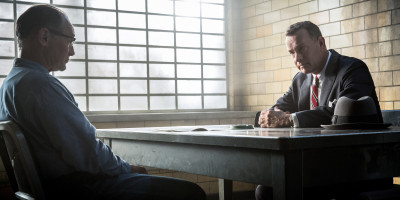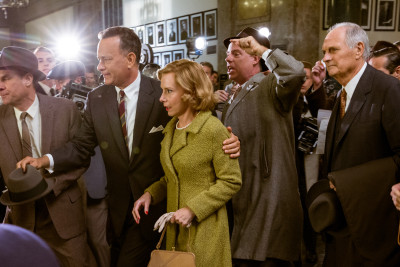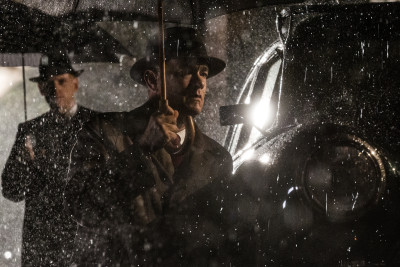
Brooklyn lawyer James Donovan (Tom Hanks) meets with his client Rudolf Abel (Mark Rylance), a Soviet agent arrested in the U.S. in BRIDGE OF SPIES, directed by Steven Spielberg.
Bridge of Spies tells a story that unfolded over five years in a little under two-and-a-half hours. It’s the story of a man who was on the prosecutorial team at Nuremberg but had spent the time between then and 1957 as an insurance lawyer. Then he was asked to represent a Soviet spy and, in trying to do his job properly, became the second most hated man in America (after the spy) – until the Soviets shot down U2 pilot Francis Gary Powers.
It’s a case where real life became something out of a John LeCarre spy novel.
The film opens with the apprehension of Rudolf Abel (Mark Rylance) as a Russian spy. In order to give every appearance of a fair trial, James B. Donovan (Tom Hanks) is asked to represent him – but the trial is as fixed as it’s possible to be, with judge ignoring/overruling key objections by Donovan. In sentencing Abel, though, the judge is persuaded that the spy should not be executed – if the Russians nab one of ‘our guys’ he could be used to facilitate a trade.
Donovan and his family suffer from his defence of Abel – to the point that shots are fired through his livingroom window, barely missing his teenaged daughter.

In BRIDGE OF SPIES, directed by Steven Spielberg, Brooklyn lawyer James Donovan (Tom Hanks) and his wife Mary (Amy Ryan) become the target of anti-communist fears when Donovan agrees to defend a Soviet agent arrested in the U.S.
While the film does follow the Donovan/Abel arc, it cuts away from time to time to follow Powers (Austin Stowell) as he’s recruited as a ‘driver’ of an ‘article’ for the CIA and is shot down on his first mission – failing to activate the plane’s destruct mechanism through no fault of his own.
We also catch key moments in the life of university student Frederic Pryor (Will rogers) as he attempts to get his girlfriend out of East Berlin and winds up in prison as a spy (which he was not).
Once again, Donovan is called to help by negotiating an exchange – Powers for Abel. Once in East Berlin, he learns about Pryor and decides that he wants to get both of them for Abel. The problem is that East Germany hasn’t been recognized as an actual nation and they demand the exchange be Pryor for Abel.
Meanwhile, the Russians also agree to a one-for-one exchange – which delights Donovan’s CIA handler until Donovan makes it clear he wants to get both men back for Abel.
The main obstacle is an East German lawyer, Vogel (Sebastian Koch), a ‘friend’ of East Germany’s attorney-general.

Tom Hanks stars as James Donovan in the incredible story of an ordinary man placed in extraordinary circumstances in BRIDGE OF SPIES, directed by Steven Spielberg.
As written by Matt Charman and Joel & Ethan Coen, Bridge of Spies is an intellectual exercise in political gamesmanship that is constantly being messed with by real people. For every move there is a countermove and the game proceeds through to its conclusion in a manner that can be seen as extremely logical from the outside.
Inside the game, with the players, it’s a nerve-wracking improvise on the fly, seat of your pants, making up as you go series of moments. The in-fighting between the East German and the Russians is built up by inference and it causes Donovan no end of confusion and exasperation – just as his insistence on getting both Pryor and Powers for Abel drives his handler nuts.
There is considerable dark humor here – no doubt courtesy of the Coen Brothers – but even with Spielberg directing, there are times when Bridge of Spies seems to be plodding a bit (using my usual soda pop metric, my big drink ran out fifteen minutes before the credits rolled).
Given the performances, though, Bridge of Spies is mostly mesmerizing. Rylance and Hanks both stand out: Rylance as the calmly humorous spy who responded to questions like ‘Aren’t you worried?’ with ‘Would it help?’; Hanks as an Everyman with wit and teeth.
When either of them are onscreen the film is great; when they on together, it soars.
Final Grade: A-
Photos courtesy of Walt Disney Studios, DreamWorks and Amblin Entertainment